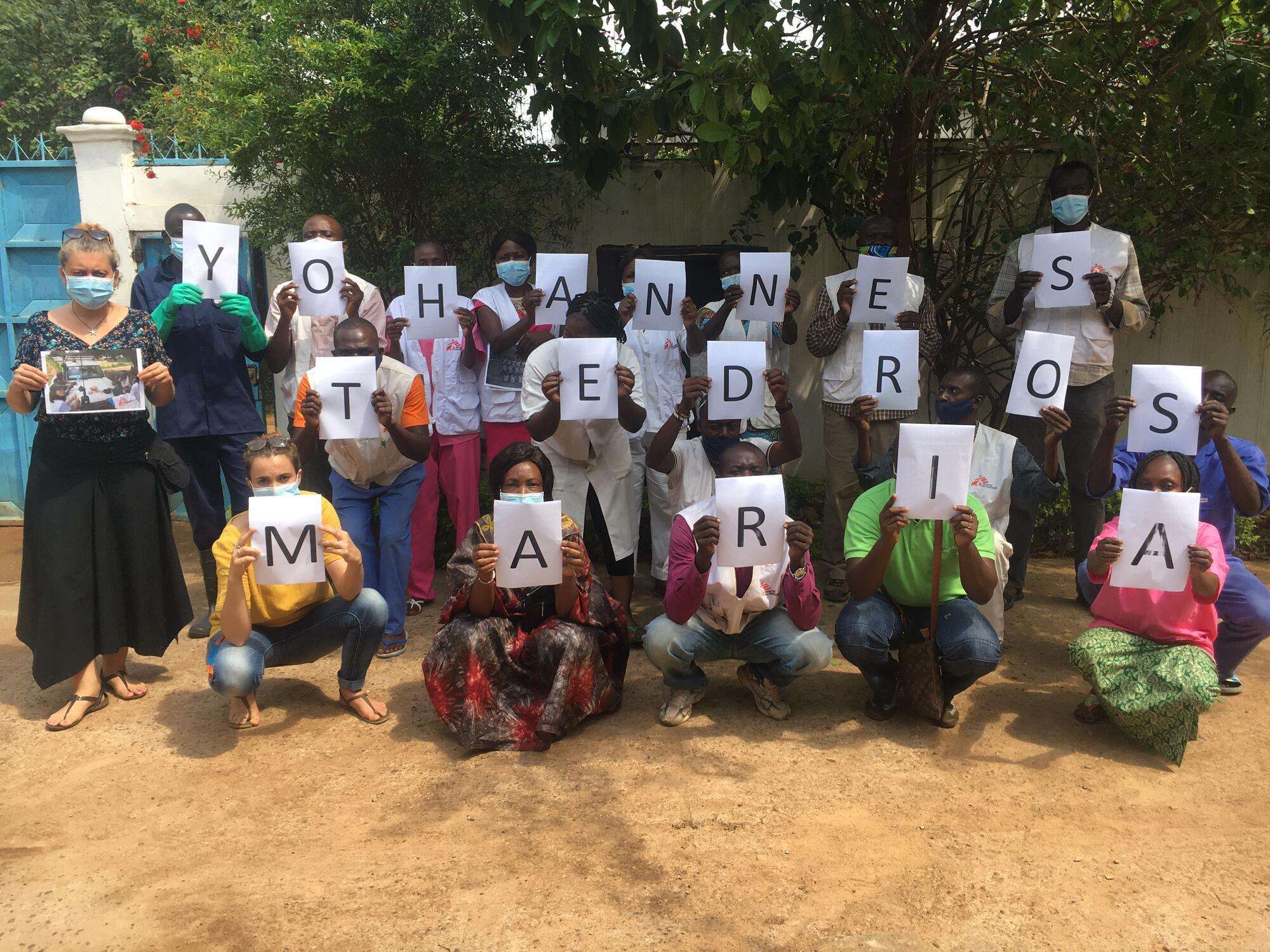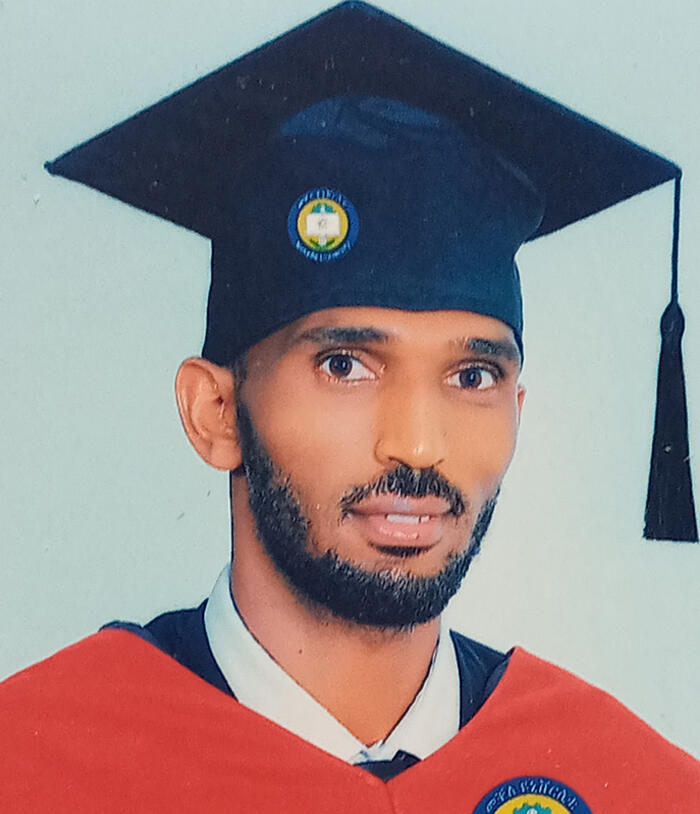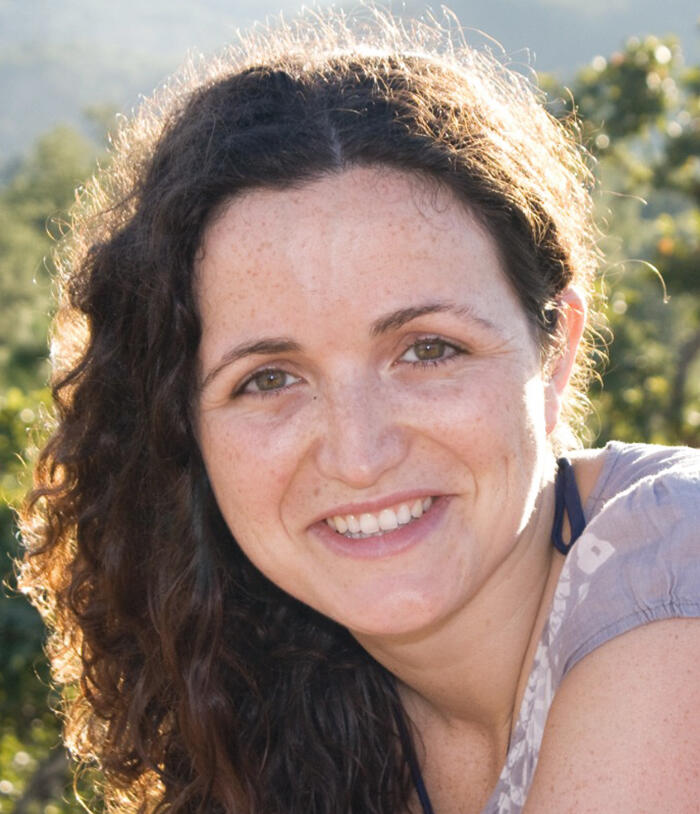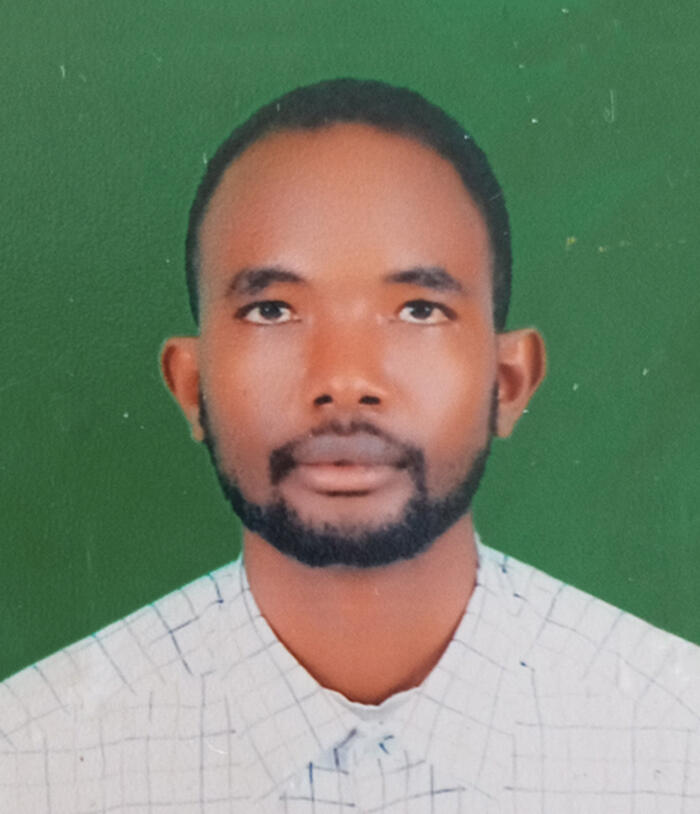Yohannes Halefom, María Hernández, and Tedros Gebremariam were killed in an apparent attack on June 24, 2021, in Tigray, Ethiopia. Here, their Doctors Without Borders/Médecins Sans Frontières (MSF) colleagues remember them.
YOHANNES HALEFOM REDA
Yohannes was born on November 3, 1991, in Mekele, Ethiopia, where he earned a master's degree in public health while serving as leader of the Students’ Association. He was the medical director of Samre hospital in southeastern Tigray and worked for other international organizations before joining MSF in February 2021. He became assistant coordinator of our Abi Adi project, which he helped launch.
Helmer Charris, MSF project coordinator in Abi Adi until March 2021:
“From the very beginning, when we started the recruitment process, it was clear that Yohannes was a bright young man. He was always very respectful. He had a delicacy that contrasted with his physique, because he was a big guy. He was the best candidate for the position and to all of us, without exception, he seemed to be a person with a promising future. We were happy that he joined the team. I remember that on his CV, under his name, he had written a slogan that said: "My dream is that everyone has access to health."
For me, Yohannes was like my other half. He was always very conscientious, he understood the principles of MSF very well, and he maintained a certain serenity at all times, despite following with concern the evolution of the conflict in Tigray.
The most vivid memories I have of Yohannes are of his gentleness and serenity, and his constant comments about returning to Mekele to marry his fiancée. He said that he would like us to be able to return to Tigray when it was a land of peace, to see all the wonderful things in the region, to admire its landscapes, and, above all, to meet his family and his future wife. He hoped that the project in Abi Adi would only be temporary because, in the near future, peace was going to come to Tigray.”
Momoh Sieh Turay, MSF logistician in Abi Adi until April 2021:
“Yohannes was an amazing man. I met him when he first started at MSF, when we were planning a needs assessment in the area to open the Abi Adi project.
He was a calm and respectful person, he liked what he did, he enjoyed the work. I remember him telling me, ‘I've worked for other organizations before, but now I feel like I'm learning.’ He never voiced any complaints. He was always striving to understand the needs of the people and what MSF could do to help. It is a tremendous loss for the organization.... I pray that wherever you are, you are happy.”
Mayur Kale, MSF project coordinator in Abi Adi from March to April 2021:
“Yohannes was a brilliant and committed humanitarian who earned the respect not only of his colleagues but also of the people we served in every corner of Tigray. He passionately advocated for the population to receive free and accessible medical services, and he worked hard to provide aid to the most remote areas. He received a large number of calls from people, a responsibility he gladly accepted. And every time he received a call, he was prepared.
In Abi Adi, together with other health staff and workers, he made an effort to restore the health system, which served a population of half a million. He worked hard to ensure that there was electricity in the hospital, to restore the mobile clinic network to improve access to medical care in outlying areas, [and] to protect the ambulances that could be used for patients. Yohannes was always ready for everything and will always be with us.
Yohannes, or ‘John’ as he was affectionately nicknamed, joined MSF only five months ago, but he was a born humanitarian and believed in MSF passionately. As his supervisor, the last sentence I wrote in his evaluation was, ‘I wish you good luck in the future, and I hope that we will meet again in the MSF world!’ Unfortunately, this cannot be the case. Going back to Abi Adi, ‘the great village,’ will no longer be the same. The void and loss can only be filled by honoring his memory and continuing to work for those in need.”
Igor García, communications advisor for MSF’s emergency unit:
“I met Yohannes during a visit to Tigray in March to document how the conflict was affecting people in different places across the region. Abi Adi was the most recent project opened there by MSF.
Yohannes accompanied me at all times during several visits to schools, which had become the epicenter of a huge displacement crisis. We spent hours interviewing men and women who had lost everything, often even their loved ones, who were sleeping outdoors with young children, struggling every day to have something to put in their mouths after being on the go for weeks or months, with the uncertainty of not knowing what the future would bring.
Each conversation created a lump in our throats, and at times it was impossible to continue. We had to stop for a few moments to cope with the emotion. I remember the integrity and professionalism of Yohannes. I remember the silences, the looks of understanding, the gestures of empathy, and, despite the difficulty of listening to his own people tell such harsh and horrific stories, Yohannes maintained his calm and an indestructible commitment to help put a face to and explain, in the most faithful way possible, the consequences of a war unwanted by anyone and that caught everyone by surprise. Rest in peace, my friend.”
MARÍA HERNÁNDEZ
María, 35, was born in Madrid but grew up in the village of Sanchotello in Salamanca, Spain. She first worked for MSF in June 2015 as deputy financial coordinator in Central African Republic, then as financial coordinator in South Sudan (from October 2015) and in Yemen (from May 2017). Subsequently, María coordinated MSF projects in Yemen, Mexico, Nigeria, Central African Republic, and, finally, in Ethiopia.
Mayur Kale, former project coordinator in Abi Adi, central Tigray, Ethiopia:
“María had a personality that forced you to remember her—for her dedication, her passion to do more, her long brown curls, and her beautiful smile.
As a coordinator, María inspired staff and communities to work for the most vulnerable people. Her direct, always-smiling manner was not only an expression of her professionalism but also her incredible diplomatic skills. María was a person who knew what was needed and what had to be done. She was so connected to the community that the medical director of Axum hospital had tears in his eyes when he offered us his condolences.
Abi Adi had a place in my heart and, when I was told that María would be the next coordinator of the project, I felt that there was no one better to hand over my responsibilities to. Helmer, the first coordinator there, was much admired for restoring health services in Abi Adi. I was just a man filling the gap and giving way to another admired person, whose work in Tigray (launching the projects in Adigrat and Axum and continuing in Abi Adi) will never be forgotten by anyone. Even on her last trip, she was doing what she really loved: opening a path for injured people; for people who had not yet received help.”
The MSF Mexico team:
“We are heartbroken. We can only thank María deeply for her enthusiasm and dedication during the year we were lucky enough to work with, share with, and learn from her. She left her mark on many of us. She shared her story with us and her permanent smile and energy were infectious. She was a woman who did not stop. She traveled [Mexico] from north to south to help migrants and refugees. In just one year, she generated changes and inspired us with her commitment and dedication. Her legacy is her work and she will continue to be present in everything we do on the migration route.
Her departure is desperately unfair. We feel a deep sadness; it has been devastating. There are lives that, although brief, leave an indelible mark in their wake. In María's case, despite our outrage and anger, we prefer to celebrate her life. We hope we can transform these overwhelming feelings into energy to honor her with our work. That's what María would have done.”
Shinjiro Murata, general director of MSF Japan, worked with María in South Sudan:
“María was a person with a warm heart, a permanent smile, and a cheerful character. Wherever she was, people felt lucky to be by her side. It was an honor for me to work with her in South Sudan in 2015 and 2016.
Not only was María excellent at her job, but she also had a great intellectual appetite. She liked to participate in debates. One day, she told us about her next steps: ‘I want to be a project coordinator.’ After South Sudan, I learned that she had gone on difficult assignments, like the one in Yemen. I can imagine that, on this last one in Tigray, she felt an enormous responsibility to respond to the needs of the people. She was a wonderful woman and a great humanitarian.
It is a tremendous loss for MSF. For everyone who knows María, it is still hard to believe what has happened. But we have to move on. We have to move forward for her and for the people who need us.”
María José Sagrado, MSF epidemiologist, worked with María in Yemen:
“Dear María, from day one you helped me feel as if I had come home. You had that ability to take care of the team and make us feel that, even in the midst of so much horror and sadness—which is what wars are—we were one big family and we were there to do what we did best: help others.
I remember I spent my birthday [in Yemen] and you gave me a headscarf just like yours, because I'd told you I loved the one you were wearing.
One of the things I liked the most was spending time with you after work, on the roof of the office in Sana'a. It became one of my favorite moments of the day. We would tell each other about our days or we would simply look at the rooftops of the city and think about the people of Yemen—or we would talk about ourselves, two Madrid girls in their 30s.
You were special, María. You had that ‘something’ that very few people have, that touches the heart and stays forever. You were a restless soul, always with a smile on your face; a great person, and a wonderful woman. You will always be in our hearts. Rest in peace, my friend. Fly high!”
Ana de la Osada worked with María in South Sudan:
“‘You are going to go far at MSF.’ This is what I thought shortly after I started working with María in Juba, South Sudan. It had been a few months since she had started at MSF and she brought a lot of enthusiasm and energy in her backpack.
She was always curious and attentive to details, with a great ability to analyze things and with the humility to ask what she did not know or understand. I think that South Sudan in 2016 was a good schoolroom in which to reinforce even further her desire to grow within the humanitarian world. I was not wrong. María went far at MSF, as far as she could. It’s just so sad that she was made to stop on the road too soon.
If there is one thing that I remember from that time, it is the car journeys every morning from our house to the office. To start the day with good energy, we created a playlist of songs to accompany us throughout the journey. If ever I didn't want to put the music on, there was always a ‘Come on, Osadilla!’ from María to encourage me to play it, especially in the difficult times we went through due to the situation in the country. Pure energy and drive: that's how she was.
Thank you, my friend.”
TEDROS GEBREMARIAM
Tedros, 37, grew up in the town of Abi Adi, in central Tigray. He was educated at Abi Gidi school before graduating from Abi Adi Technical and Vocational College in 2008. He joined MSF in May 2021 as a driver, a job he had held previously with other companies.
Negin Allamehzadeh, MSF communications manager in Tigray:
“Tedros’s lifelong friend Haftom, also an MSF colleague, told us that as a child Tedros loved to play football. When they left school, what they liked most was collecting firewood, lighting a fire, and cooking injera [Ethiopian flatbread]. Haftom remembers him as wise and centered—and if you ever had the pleasure to meet Teddy, as all his friends called him, it’s easy to understand what he means. Teddy was a soft-spoken and gentle person, with a generous spirit. When our team first arrived in Abi Adi, all the businesses were closed, and Teddy volunteered his expertise and time to help us find parts and fix our vehicles so we could continue reaching rural communities to assess medical needs.
The eldest of two brothers, he was a focused and hardworking person. It was his interest in cars that led him to take his first job as a driver at a renewable energy company in Wukro, before he returned to Abi Adi to drive for Wegagen Bank. Eventually, he started his own taxi business for several years. It was in May that Teddy officially joined MSF as a driver, together with his younger brother, who joined the organization as a security guard.
Teddy lived in Abi Adi with his wife and two daughters: an eight-year-old and a baby born less than three months ago. What Teddy most enjoyed was spending time with his family and his elderly mother. He was proud to be able to take care of his mother, who had worked hard in the market every day to support her two children. And he loved Bollywood movies, which he often watched after work with Haftom.
He treated everyone with courtesy and respect. This is how everyone remembers Teddy: peaceful, friendly, kind, and above all, generous. We all loved him. It hurts a lot to lose him.”







